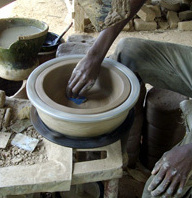Structured finance designed by the “profit for purpose” organisation offers companies, NGOs and nation states the chance to put private funds behind clean water in return for carbon credits.
ClimateCare originates and sources carbon credits on behalf of large corporates, NGOs, and sovereigns and manage voluntary offset schemes for organisations and sell offsets to individuals. They develop carbon emission reducing projects like water filters that disinfects water without boiling, cooking stoves that efficiently use wood and introduces them to Sub-Saharan Africa and throughout the world for both compliance and voluntary carbon markets as well as the newer emergent Climate and Development finance funds. Focus is on innovation and sustainable development. Every project is designed to contribute towards fulfilling the Millennium Development Goals (MDGs).
The new clean water initiative is the latest in ClimateCare’s portfolio of investment projects. These have already opened up a stream of funding for 750,000 clean cook stoves in sub-Saharan Africa, Bangladesh and Cambodia, saving over 12.5m tonnes of CO2 equivalent so far.
Traditionally, challenges such as protecting forests from logging, eliminating indoor air pollution, reducing greenhouse gases and promoting local enterprise are tackled separately in developing countries. But ClimateCare interconnect them with their sustainable financing model
The stoves replace open fires or poor quality alternatives, reducing demand for wood and charcoal and cutting hazardous in-door pollution that causes millions of deaths in the developing world. Because less time is spend on finding wood it can be spend on increasing income and education. The manufacturing of the stoves provides local employment, while the subsidy from carbon finance supports a growing local market.
Coupled with continuous monitoring for carbon accreditation, this not only creates sustainable development but is also successfully attracting new financing on the back of audited results.
ClimateCare adapted the cook stove model to support the launch of Vestergaard Frandsen’s LifeStraw water filter in rural Kenya in 2011. As a result, the health products company was able to deliver 900,000 filters in just two months, paving the way for wider distribution in years to come.
Carbon for Water is now a multi-year project, with every filter logged and monitored. The filters avoid the need to boil water over firewood, again easing pressure on deforestation and cutting harmful indoor emissions.
One of the world’s largest clean water and carbon reduction interventions, the project proves the viability of combining private finance, carbon offsetting, environmental protection, healthcare and poverty alleviation in a single initiative.
As author of the methodology, which measures emissions savings according to the Gold Standard for carbon credits, ClimateCare’s role was central. The project has the potential to transform hundreds of millions of lives and is, it claims, a step-change towards achieving key Millennium Development Goals.
Like the cook stove model, Carbon for Water has sustainability – particularly the financial sustainability – built in and has so far provided 4.5 million people with access to a safe source of clean water.
Shortlisted for the Guardian Sustainable Business 2012 award

Comments by our Users
Be the first to write a comment for this item.